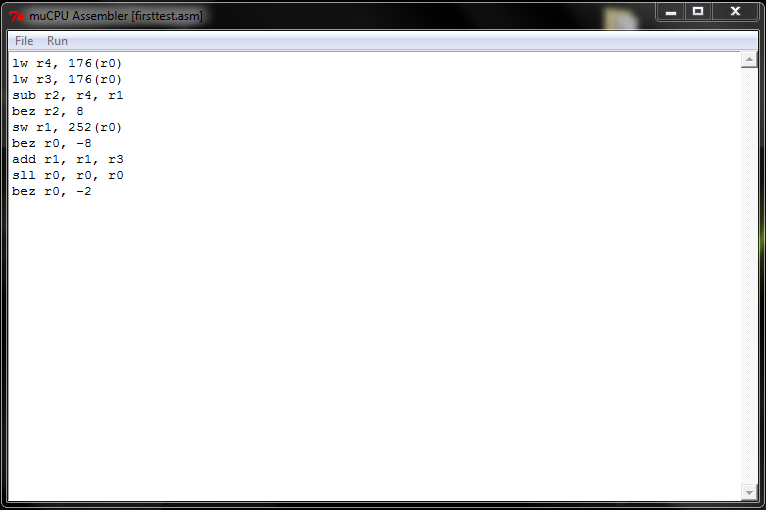As I was writing some simple test code to run on my processor testbench (in iSim), I found that it was tedious and slow to write hex instructions from assembly mnemonics. What better solution to a problem that is tedious than a program that does the hex encoding over and over. I wrote a simple application in Python (because of its simple, powerful string manipulation functions) to "assemble" very rudimentary assembly language instructions. Screenshots and code below.
Input:
Output:
0 => x"84b0", 1 => x"83b0", 2 => x"2142", 3 => x"5008", 4 => x"c1fc", 5 => x"40f8", 6 => x"0b21", 7 => x"0000", 8 => x"40fe",Code:
from Tkinter import *
import re
from tkFileDialog import *
import os.path
import sys
filename = "Untitled"
fileexists = False
def asmtoint(asm):
asm_split = re.split(" |, |\(|\)", asm)
args = []
for i in range (len(asm_split)):
if (asm_split[i] != ""):
args.append(asm_split[i])
#print args
opcode = 0
func = 0
rd = 0
rs = 0
rt = 0
imm = 0
if (args[0] == "sll"):
if (len(args) != 4):
return 0,0,0,0,0,0
opcode = 0
func = 0
rd = int(args[1][1:])
rs = int(args[2][1:])
rt = int(args[3][1:])
elif (args[0] == "add"):
if (len(args) != 4):
return 0,0,0,0,0,0
opcode = 0
func = 1
rd = int(args[1][1:])
rs = int(args[2][1:])
rt = int(args[3][1:])
elif (args[0] == "sub"):
if (len(args) != 4):
return 0,0,0,0,0,0
opcode = 0
func = 2
rd = int(args[1][1:])
rs = int(args[2][1:])
rt = int(args[3][1:])
elif (args[0] == "nand"):
if (len(args) != 4):
return 0,0,0,0,0,0
opcode = 0
func = 3
rd = int(args[1][1:])
rs = int(args[2][1:])
rt = int(args[3][1:])
elif (args[0] == "nor"):
if (len(args) != 4):
return 0,0,0,0,0,0
opcode = 0
func = 4
rd = int(args[1][1:])
rs = int(args[2][1:])
rt = int(args[3][1:])
elif (args[0] == "bez"):
if (len(args) != 3):
return 0,0,0,0,0,0
opcode = 1
rt = 0
rs = int(args[1][1:])
imm = int(args[2])
elif (args[0] == "bnez"):
if (len(args) != 3):
return 0,0,0,0,0,0
opcode = 1
rt = 1
rs = int(args[1][1:])
imm = int(args[2])
elif (args[0] == "bgez"):
if (len(args) != 3):
return 0,0,0,0,0,0
opcode = 1
rt = 2
rs = int(args[1][1:])
imm = int(args[2])
elif (args[0] == "blez"):
if (len(args) != 3):
return 0,0,0,0,0,0
opcode = 1
rt = 3
rs = int(args[1][1:])
imm = int(args[2])
elif (args[0] == "bgz"):
if (len(args) != 3):
return 0,0,0,0,0,0
opcode = 1
rt = 4
rs = int(args[1][1:])
imm = int(args[2])
elif (args[0] == "blz"):
if (len(args) != 3):
return 0
opcode = 1
rt = 5
rs = int(args[1][1:])
imm = int(args[2])
elif (args[0] == "lw"):
if (args[-1] == ''):
args = args[0:-1]
if (len(args) != 3 and len(args) != 4):
return 0,0,0,0,0,0
opcode = 2
rt = int(args[1][1:])
if (len(args) == 3):
imm = 0
rs = int(args[2][1:])
else:
imm = int(args[2])
rs = int(args[3][1:])
elif (args[0] == "sw"):
if (args[-1] == ''):
args = args[0:-1]
if (len(args) != 3 and len(args) != 4):
return 0,0,0,0,0,0
opcode = 3
rt = int(args[1][1:])
if (len(args) == 3):
imm = 0
rs = int(args[2][1:])
else:
imm = int(args[2])
rs = int(args[3][1:])
else:
return 0,0,0,0,0,0
return opcode, rs, rt, rd, func, imm
def inttohex(opcode, rs, rt, rd, func, imm):
if (opcode == 0):
opstr = format(opcode, '02b')
rsstr = format(rs, '03b')
rtstr = format(rt, '03b')
rdstr = format(rd, '03b')
fnstr = format(func, '05b')
#print opstr, rsstr, rtstr, rdstr, fnstr
instruction = opstr + rsstr + rtstr + rdstr + fnstr
else :
opstr = format(opcode, '02b')
rtstr = format(rt, '03b')
rsstr = format(rs, '03b')
if (imm < 0):
imm2s = ((-imm) ^ 255) + 1
immstr = format(imm2s, '08b')
else :
immstr = format(imm, '08b')
#print opstr, rtstr, rsstr, immstr
instruction = opstr + rsstr + rtstr + immstr
return format(int(instruction, 2), '04x')
def decode(asm):
opcode, rs, rt, rd, func, imm = asmtoint(asm)
instruction = inttohex(opcode, rs, rt, rd, func, imm)
return instruction
def openFile():
global filename
openfilename = askopenfilename()
if openfilename is not None:
filename = openfilename
asmfile = open(filename, "r")
asmfile.seek(0)
asmdata = asmfile.read()
textArea.delete("1.0", "end - 1c")
textArea.insert("1.0", asmdata)
asmfile.close()
filemenu.entryconfig(filemenu.index("Save"), state = NORMAL)
frame.title("muCPU Assembler [" + filename + "]")
frame.focus()
def saveFile():
global filename
asmdata = textArea.get("1.0", "end - 1c")
asmfile = open(filename, "w")
asmfile.seek(0)
asmfile.truncate()
asmfile.write(asmdata)
asmfile.close()
def saveFileAs():
global filename
global fileexists
saveasfilename = asksaveasfilename()
if saveasfilename is not None:
filename = saveasfilename
fileexists = True
asmdata = textArea.get("1.0", "end - 1c")
asmfile = open(filename, "w")
asmfile.seek(0)
asmfile.truncate()
asmfile.write(asmdata)
asmfile.close()
filemenu.entryconfig(filemenu.index("Save"), state = NORMAL)
frame.title("muCPU Assembler [" + filename + "]")
frame.focus()
def exitApp():
frame.destroy()
sys.exit()
def compileASM():
global filename
cpu_out = ""
asm_in = textArea.get("1.0", END)
asmlines = re.split("\n", asm_in)
for i in range (len(asmlines)):
if (asmlines[i] != ""):
#print asmlines[i]
cpu_out += str(i) + " => x\"" + decode(asmlines[i]) + "\",\n"
#print cpu_out
name, ext = os.path.splitext(filename)
hexfilename = name + ".hex"
hexfile = open(hexfilename, "w")
hexfile.seek(0)
hexfile.truncate()
hexfile.write(cpu_out)
hexfile.close()
Tk().withdraw()
frame = Toplevel()
scrollbar = Scrollbar(frame)
scrollbar.pack(side = RIGHT, fill = Y)
frame.title("muCPU Assembler [" + filename + "]")
textArea = Text(frame, height = 30, width = 100, padx = 3, pady = 3, yscrollcommand = scrollbar.set)
textArea.pack(side=RIGHT)
scrollbar.config(command=textArea.yview)
menubar = Menu(frame)
filemenu = Menu(menubar, tearoff=0)
filemenu.add_command(label="Open", command=openFile)
filemenu.add_command(label="Save", command=saveFile, state = DISABLED)
filemenu.add_command(label="Save as...", command=saveFileAs)
filemenu.add_command(label="Exit", command=exitApp)
menubar.add_cascade(label="File", menu=filemenu)
runmenu = Menu(menubar, tearoff=0)
runmenu.add_command(label="Compile", command=compileASM)
menubar.add_cascade(label="Run", menu=runmenu)
frame.config(menu=menubar)
frame.minsize(750, 450)
frame.maxsize(750, 450)
frame.mainloop()
#Sample counting loop code
"""
lw r4, 176(r0)
lw r3, 177(r0)
sub r2, r4, r1
bez r2, 8
sw r1, 252(r0)
bez r0, -8
add r1, r1, r3
sll r0, r0, r0
bez r0, -2
"""
 Reed Foster
Reed Foster
Discussions
Become a Hackaday.io Member
Create an account to leave a comment. Already have an account? Log In.